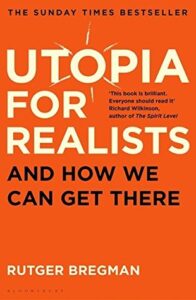 Utopia for Realists, Rutger Brenman
Utopia for Realists, Rutger Brenman
Utopia for Realists set out the case for three major things which would build a better world, a utopia in which we not only have unprecedented prosperity but that prosperity is more evenly shared, and people do worthwhile work:
- A shorter workweek
- Universal basic income
- Open borders
As far as I can tell, Brenman has his facts in order, citing studies and real-world circumstances which support the suggestions he makes. Giving homeless people free cash, no strings attached, seems to have a better result than any other intervention, according to the studies he cites; shorter work weeks were almost actually implemented before they slipped off the political agenda; the numbers suggest that immigration will boost economies…
There are a lot of studies mentioned and footnoted, and a lot of sources to check; I did a little digging, but not more than that. I feel like I know so little about economics that Brenman could be saying “we should dye all ducks green” in economics-ese and I would just be nodding along. He writes very convincingly (with a few slip-ups like calling people with disabilities “cripples” — hopefully something introduced by the book’s translator rather than baked into the original text) and often aligns with my own ideas and ideals, so it’s not surprising that I feel the urge to nod along.
I did have a couple of criticisms that even I noticed, though. One example was his claim that immigration doesn’t harm social cohesion… only to claim that open borders couldn’t be introduced immediately because of the impact on social cohesion. Yikes, dude. You literally just said there’s no effect, two pages before. He also explicitly mentions rejecting a study because of his own opinions on the subject, and never actually discusses the results of that study and why he would rationally put it aside. There are a couple of other bits and pieces like that — inconsistencies and eyebrow-raising moments.
He also exhorts people at the end to be idealists, after setting out his case that utopia is achievable. I see what he means — it is achievable, if his data and theories are correct, but it requires people willing to commit to it and believe it, and in the face of so much opposition that does take an idealist, not a realist. It’s still a bit of a contradition, though…

Leave a Reply